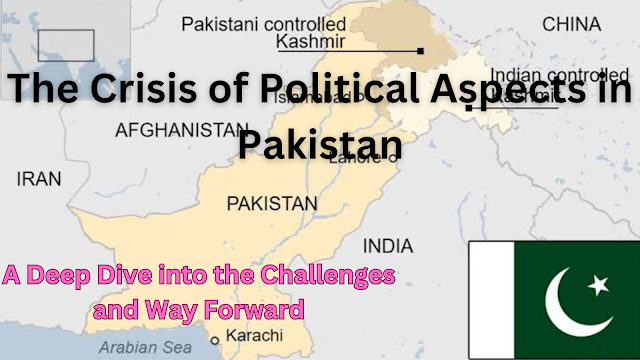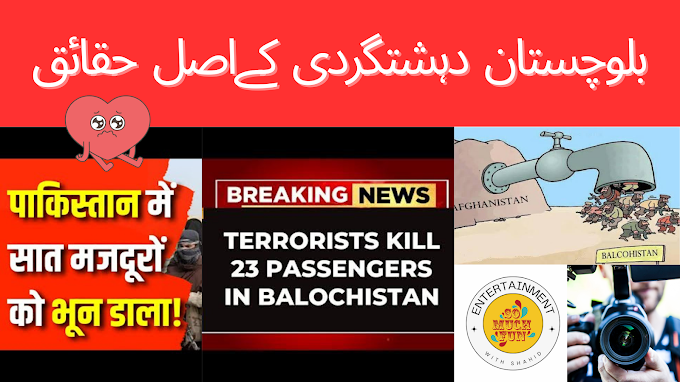Political stability is crucial for the development and progress of any nation. However, Pakistan, since its inception in 1947, has struggled with political instability and crises that have hindered its growth and development. The country has experienced multiple military coups, fragile democratic institutions, power struggles, and civil-military tensions that have contributed to a persistent state of political crisis. In this blog post, we will explore the various facets of Pakistan's political crisis, the underlying causes, and potential solutions to navigate these challenges.
A Brief Overview of Pakistan's Political History
Pakistan was established as a sovereign state in 1947, following the partition of British India. The country's early years were marked by political turmoil and instability. The death of its founding leader, Muhammad Ali Jinnah, in 1948 and the assassination of its first Prime Minister, Liaquat Ali Khan, in 1951, created a vacuum in leadership and governance. This set the stage for a series of political upheavals, including frequent changes in government, the imposition of martial law, and the dismissal of elected governments.
The country has experienced three major military coups (1958, 1977, and 1999) and has been under military rule for over 30 years of its history. Even during periods of civilian rule, the military has exerted significant influence over political affairs. This civil-military imbalance has been a major factor contributing to Pakistan's political crisis.
The Key Aspects of Pakistan's Political Crisis
1. Civil-Military Relations
One of the most significant aspects of Pakistan's political crisis is the strained relationship between civilian governments and the military. The military has historically viewed itself as the guardian of Pakistan's sovereignty and ideological frontiers, often stepping in to take control during perceived political instability. This has led to a cycle of military intervention in politics, weakening democratic institutions and governance.
The military's involvement in politics has also fostered an environment of political uncertainty and instability. Civilian governments often operate under the looming threat of military intervention, making it challenging to implement long-term policies and reforms. This power dynamic has created a governance deficit, where elected officials are unable to fully exercise their authority.
2. Fragile Democratic Institutions
Pakistan's democratic institutions have remained weak and fragile due to a lack of continuity and political maturity. Frequent disruptions in the democratic process, such as military coups and the dismissal of elected governments, have prevented the evolution of robust democratic norms and practices. As a result, political parties in Pakistan often function more as personality cults rather than ideologically driven entities, centered around individual leaders rather than institutional development.
Furthermore, Pakistan's electoral processes have been marred by allegations of rigging, manipulation, and interference by both domestic and external actors. This has led to a lack of public confidence in the electoral system, exacerbating the political crisis.
3. Corruption and Patronage Politics
Corruption and patronage politics have been endemic in Pakistan's political landscape. Political leaders and parties often engage in corrupt practices to secure votes, consolidate power, and maintain their influence. This has undermined governance and public trust in political institutions. Corruption has also diverted resources away from critical areas like education, healthcare, and infrastructure development, impeding Pakistan's socio-economic progress.
Patronage politics, where political leaders use state resources and positions to reward loyalists and supporters, has also weakened governance and accountability. It fosters a culture of favoritism and nepotism, eroding merit-based governance and institutional integrity.
4. Judiciary and Accountability Issues
The judiciary in Pakistan has also played a contentious role in the country's political crisis. While it has made significant strides in asserting its independence in recent years, the judiciary has often been perceived as politicized or influenced by external actors. This perception has undermined public trust in the judicial system and its ability to act as a neutral arbiter in political disputes.
Additionally, accountability institutions, such as the National Accountability Bureau (NAB), have often been criticized for being used as tools of political vendetta rather than genuine anti-corruption bodies. This has further deepened political polarization and distrust among political actors.
5. Ethnic and Sectarian Divisions
Pakistan is a diverse country with various ethnic and sectarian groups. However, these differences have often been exploited for political gains, leading to ethnic and sectarian tensions. The politicization of ethnic identities has resulted in regional disparities, marginalization, and grievances among various communities. This has fueled separatist movements, insurgencies, and violence in different parts of the country, contributing to political instability.
Similarly, sectarianism has been a significant issue, with extremist groups exploiting sectarian differences to further their agendas. Sectarian violence and intolerance have posed serious threats to social cohesion and national unity, further exacerbating the political crisis.
Underlying Causes of the Political Crisis
The political crisis in Pakistan is rooted in a combination of historical, structural, and socio-economic factors:
Colonial Legacy:
Pakistan inherited a centralized, authoritarian colonial administrative structure that has been difficult to transform into a participatory democratic system. This legacy has contributed to the concentration of power and lack of accountability in governance.
Lack of Political Education and Awareness:
Low levels of political education and awareness among the general public have hindered the development of a politically conscious and active citizenry. This has allowed political elites to manipulate public opinion and maintain their grip on power.
Socio-Economic Disparities:
Widespread poverty, unemployment, and socio-economic inequalities have fueled political discontent and instability. Disenfranchised groups are more susceptible to exploitation by political actors, leading to further polarization and unrest.
External Interference:
Pakistan's strategic location and geopolitical significance have made it a target of external interference and influence. This has often exacerbated internal political crises and instability.
Way Forward:
Potential Solutions to the Political Crisis
Addressing the political crisis in Pakistan requires a multi-faceted approach that involves strengthening democratic institutions, promoting good governance, and fostering social cohesion. Here are some potential solutions:
1. Strengthening Democratic Institutions
Reforming and strengthening democratic institutions is crucial for political stability in Pakistan. This includes ensuring the independence and accountability of the judiciary, strengthening the electoral system, and promoting transparency in governance. Political parties should focus on building strong institutional foundations and promoting democratic norms within their ranks.
2. Promoting Good Governance and Accountability
Good governance and accountability are essential for addressing corruption and patronage politics. This requires the establishment of robust anti-corruption mechanisms, promoting merit-based appointments, and ensuring transparency in public service delivery. Strengthening accountability institutions, such as the NAB, and ensuring their independence from political influence is also vital.
3. Fostering Civil-Military Harmony
Creating a balanced civil-military relationship is crucial for political stability. This involves defining clear boundaries between civilian and military roles, promoting dialogue and cooperation between the two, and ensuring that the military respects the democratic process. Civilian governments should work towards building their capacity to effectively govern and reduce their reliance on the military for political stability.
4. Addressing Socio-Economic Inequalities
Reducing socio-economic disparities is essential for fostering social cohesion and political stability. This requires targeted policies to address poverty, unemployment, and regional inequalities. Investment in education, healthcare, and infrastructure development is crucial for promoting inclusive growth and reducing grievances among marginalized communities.
5. Promoting National Unity and Social Cohesion
Promoting national unity and social cohesion requires addressing ethnic and sectarian divisions and promoting tolerance and inclusivity. This involves implementing policies that promote equal opportunities for all citizens, irrespective of their ethnic or sectarian backgrounds, and fostering a sense of national identity and solidarity.
Conclusion
The political crisis in Pakistan is a complex issue that requires comprehensive and sustained efforts to address. By strengthening democratic institutions, promoting good governance, fostering civil-military harmony, addressing socio-economic inequalities, and promoting national unity, Pakistan can navigate its political challenges and pave the way for a more stable and prosperous future. Political leaders, civil society, and citizens must work together to build a democratic, inclusive, and resilient Pakistan that can overcome its political crises and achieve its full potential.








Amazing
ReplyDelete